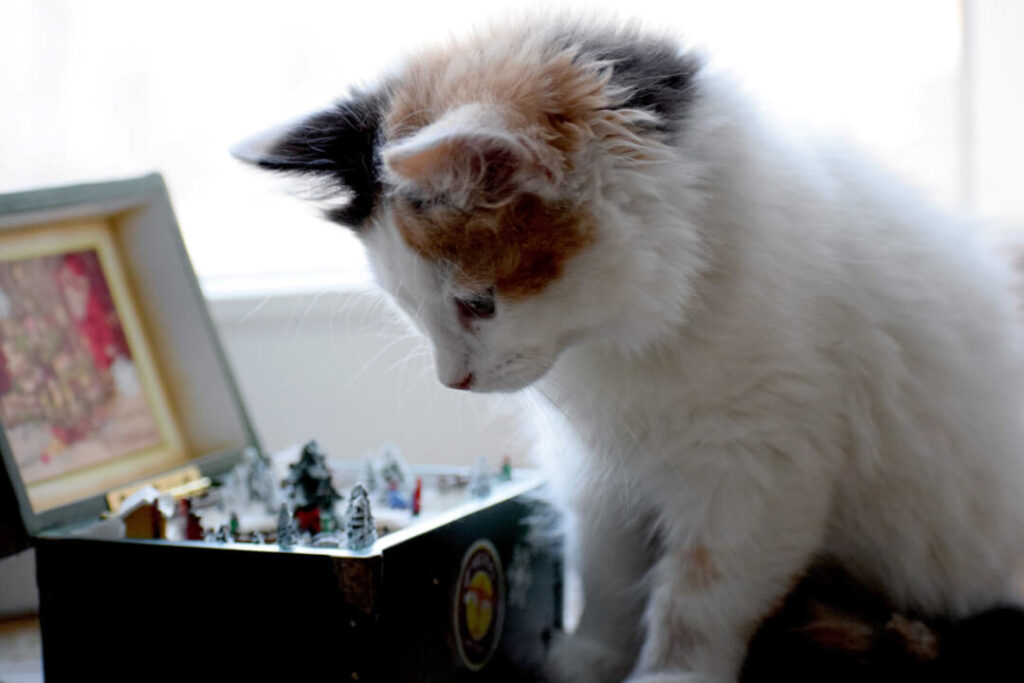Music for Cats? Is there such a thing – and if so – what information do we need to choose the right kind? Here is everything you need to know.
Music moves us as human beings.
This is due to the fact that the human brain sends all kinds of acoustic signals which are triggering emotions in the brain. But is the effect the same for cats and does it yield the same reactions?
All of these are questions that scientists and musicians have examined by performing tests on what influence music has on cats: A very positive one! – given, the right type of music is played.
But what exactly is the right kind of music for cats and why do they like it?
Can cats anticipate distinct tunes?
How do they perceive music?
Cats are excellent hunters, all their senses are refined for exactly that reason. Not only do they know how to approach their prey soundlessly, they can also feel their environment via specifically sensitive hair on their front paws. Thus, they perceive even the slightest of vibrations that we as humans normally would not even recognise – cats are purring seismographs!
In the animal realm, the hearing of cats is one of the best; it is developed to an extent that they can hear the slightest peep of a mouse. Even in their dreams! This is a matter of survival – because in the wild, they would become easy prey to their predators during nap time.
Music is always preceived by cats – even if noted down by the composer as “ppp” – pianissimo possibile (as low as possible).
Sensitive hearing
As opposed to eyes, ears unfortunately cannot be shut: Whoever shares a flat wit a cat knows when things are getting too loud for the feline housemate – a harmless vacuum cleaner may border unbearable conditions! In that case, cats choose flight over fight – off to a quiet refuge.
Your cat’s hearing is extremely sensitive! Even better than the hearing of a dog! Their ears are like big, movable hearing aids, consisting of 64 single muscles (32 in every ear); with those they can point their ears quickly in all possible directions. For this, they don’t even have to move their head.
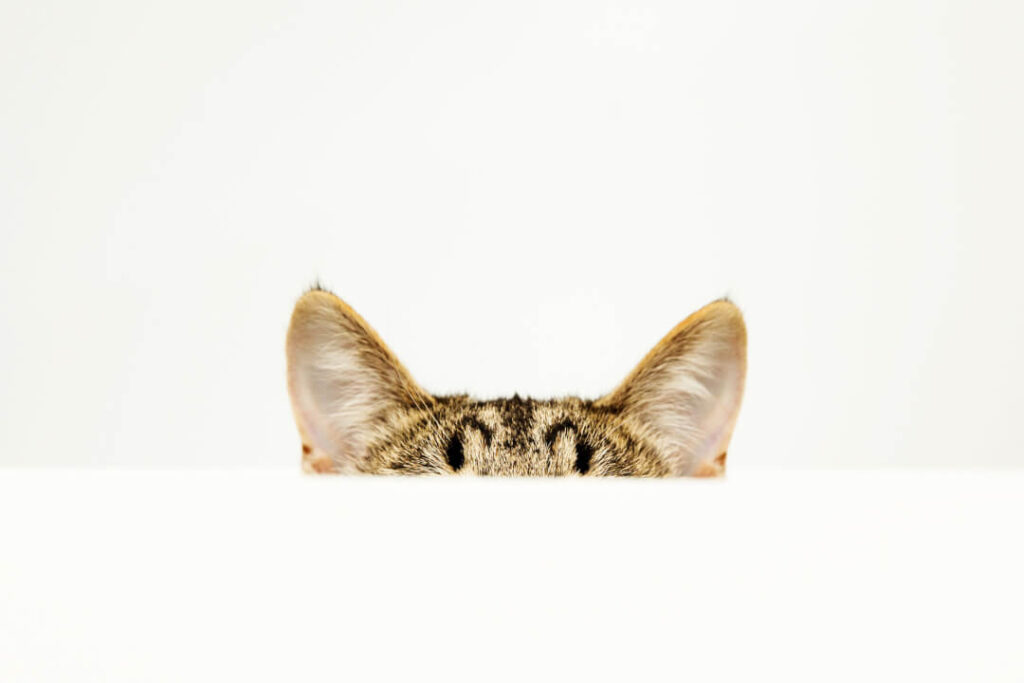
High frequencies
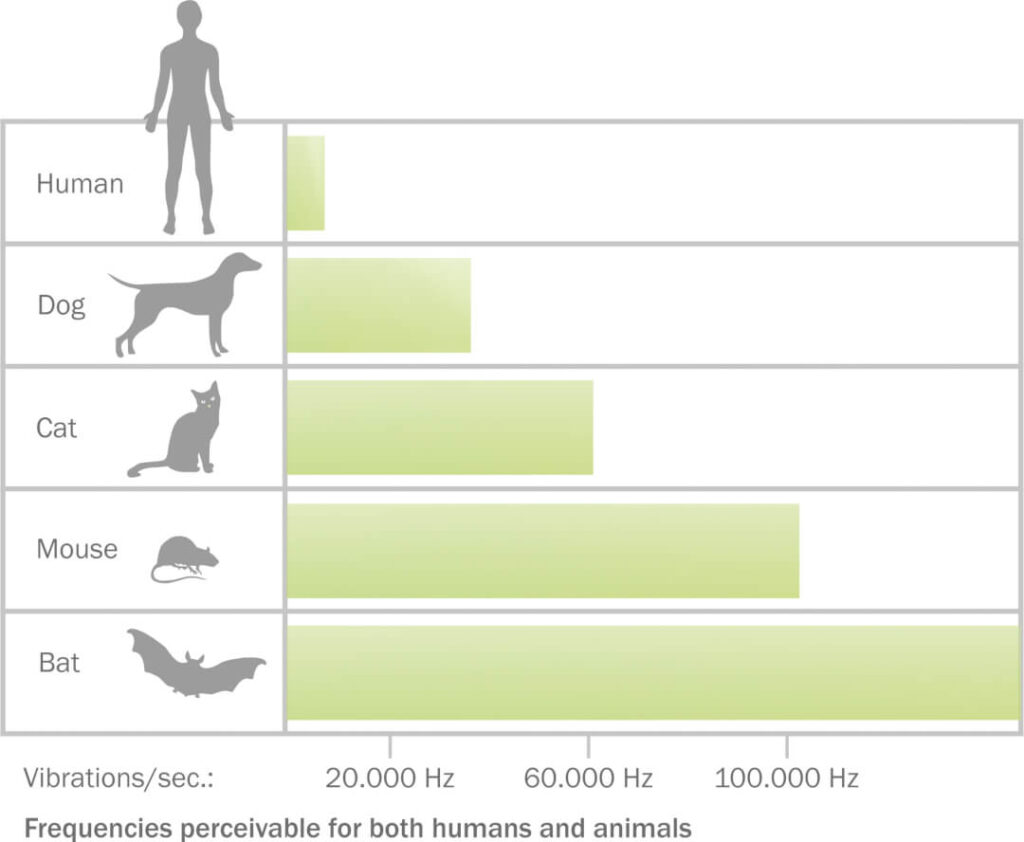
Imagine, you have an amplifier implanted in your ear – hearing everything better and louder. Cats hear a lot more than we do. They perceive sounds that we don’t even realise; much lower sounds for example, or other frequencies we are not aware of – mostly among the higher pitches.
Humans only hear sounds between the frequencies of 16 Hz to 20 kHz. Animals can hear ultra sounds of up to 20kHz to 1.6 GHz – too high a frequency for us to perceive.
Localisation of sounds
Nothing escapes a cat’s ear!
Outside or inside – even in the dark – cats know how to find their prey before the victim itself knows where it is.
The cat’s hearing does not only amplify sounds many times over – the animals can also estimate perfectly, where the noise is coming from; because their ears are extremely movable and can rotate to up to 180 degrees.
The sound hits the eardrum after having been transmitted by fine hairs, membranes and small bones through the ear canal, and signals to the cat’s brain, where the noise is coming from.
Bad hearing in old age
Cats can suffer hear-loss in old age, just the same as humans do. This is mostly a matter of blood circulation; if the ears are not well supplied with blood any more, the cat will hear less. You will realise this e.g. by an increased jumpiness because they can’t hear you approaching – or even their meowing gets louder, as they can’t hear their own voice as well as they used to.
Most cats hear less after reaching the 10th year of their life. However, cats normally learn to cope with age-related loss of hearing and will find a way to work around it.
The other senses will take over part of the tasks and help out, so to speak; an older cat has a rich wealth of experience to fall back on and will know how to adapt to the new situation.
Music has a calming effect
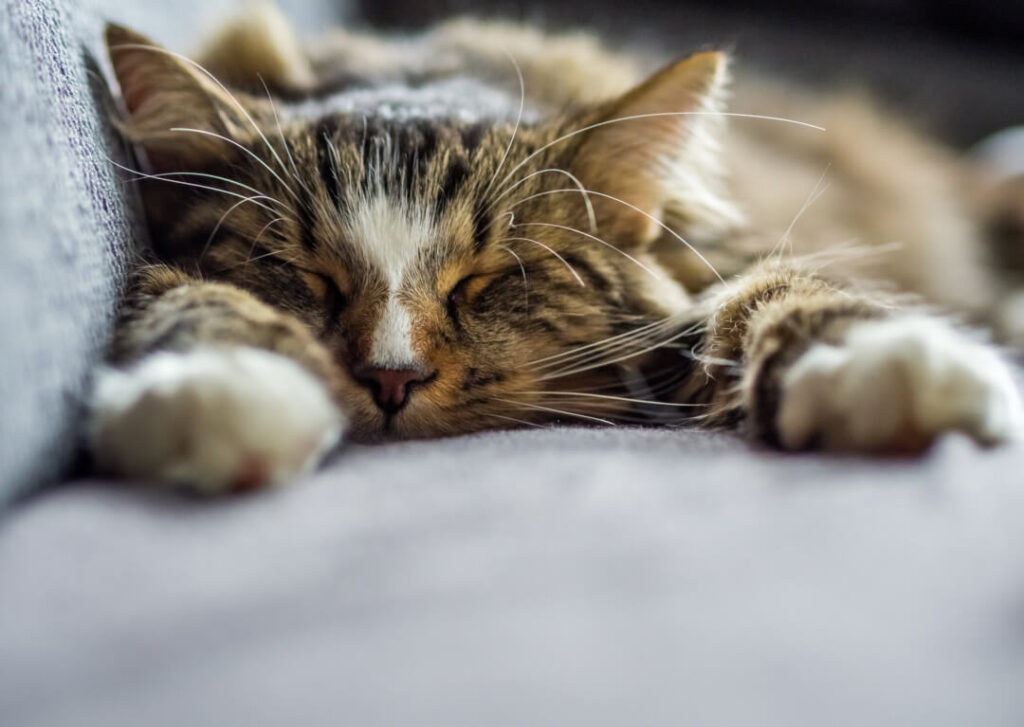
Music influences emotions.
In many a vet’s practice, music will be used to calm animals down and make the visit easier for them.
– And it works!
Certain types of music are known to be especially effective for calming cats. When cats hear this kind of music, you can tell, how quickly they relax – even fighting tom cats will calm down.
Playing relaxing music is also a good way of easing unknown or stressful situations. Prime examples are holidays like new year’s eve or long car trips – not very popular with many cats.
What music suits a cat?
Is there such a thing as cats’ music?
How about the musical “Cats”? Should our feline friends not go for it automatically? Andrew Lloyd’s melodrama counts as the most successful musical of all times – and all the leading roles are cats!
But seriously, do cats really like the same music as we do – or do they perceive it entirely differently and therefore have a much different taste in music? What counts as pleasant to them?
“What kind of music do cats like and what effect does it have on them?” – Many scientists have asked themselves the exact same question – and found an answer to it…
Species-appropriate music
Scientists of the University of Wisconsin in Madison took a closer look and examined how different cats reacted on a variety of music initially composed for human ears only. The result: There is a special kind of music which is pleasant to cats’ ears – not surprisingly, it is the type of sound best suited for their highly sensitive feline ears.
Orientated on cats’ sounds
So what tunes flatter your cat’s ears the most?
Scientist have found out that sounds perceived as pleasant during the first weeks of childhood remain the most enjoyable ones for cats throughout their lives.
When kittens come into this world, they are well fitted with a number of survival reflexes. However, in the beginning, they can’t see or hear. Only in the second week of their lives can kittens perceive their environment with all their senses.
Want to know more about a kitten’s development stages? Look here.
The first rhythms that a kitten perceives are the vibrations of their mother’s heartbeat, purring, or the drinking noises they make when sucking on their mom’s teats. These sounds are connected with comfort and security.
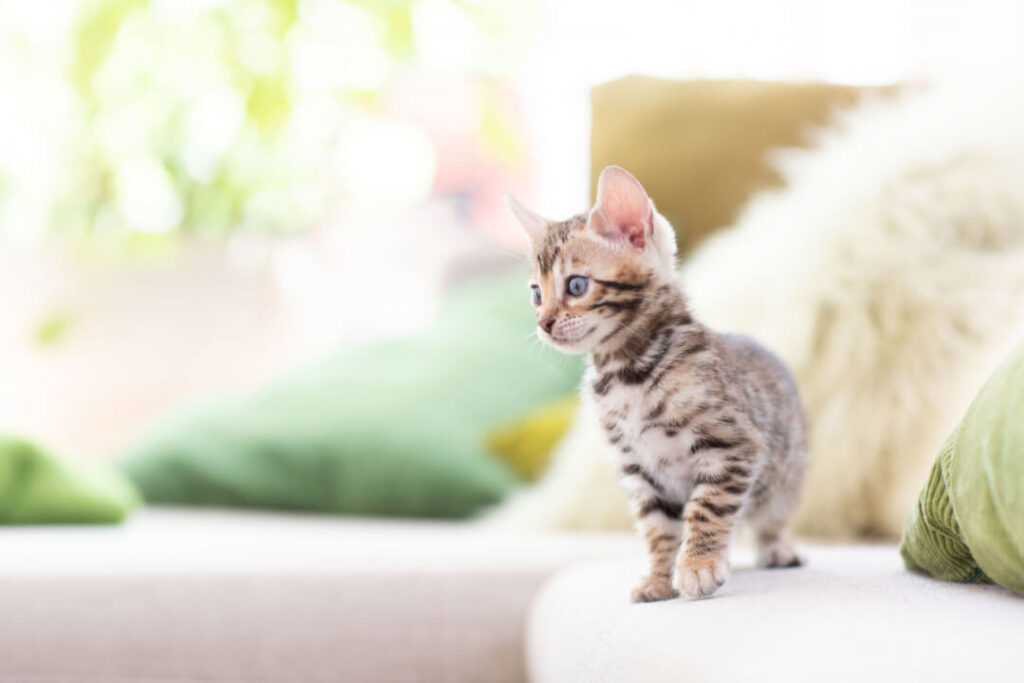
High frequencies
Cats’ feel-good music entails sounds connected to positive early-life experiences. Purring or sucking noises are therefore “top of the pops” for cats – they lead the feline charts, so to speak.
Cats like to communicate in rather high frequencies, since they simply like the sounds that are – in most cases – an octave higher than the human voice.Anyone composing music for cats should therefore include instruments with a high pitch. Perfect are the violin, cello and electronic keyboard instruments – with these, also beginners have a good chance of achieving a good spot in the cats’ top ten.
The right speed
But it is not only the tone which makes the music, dynamics and tempo also play a role!
For comparison: Purring creates 1000 beats per minute!
Based on the structure of purring sounds, frequency and tempo are most pivotal to making music which is pleasant for cats. This “purring speed” synchronises the heartbeat and allows our feline housemates to completely relax.
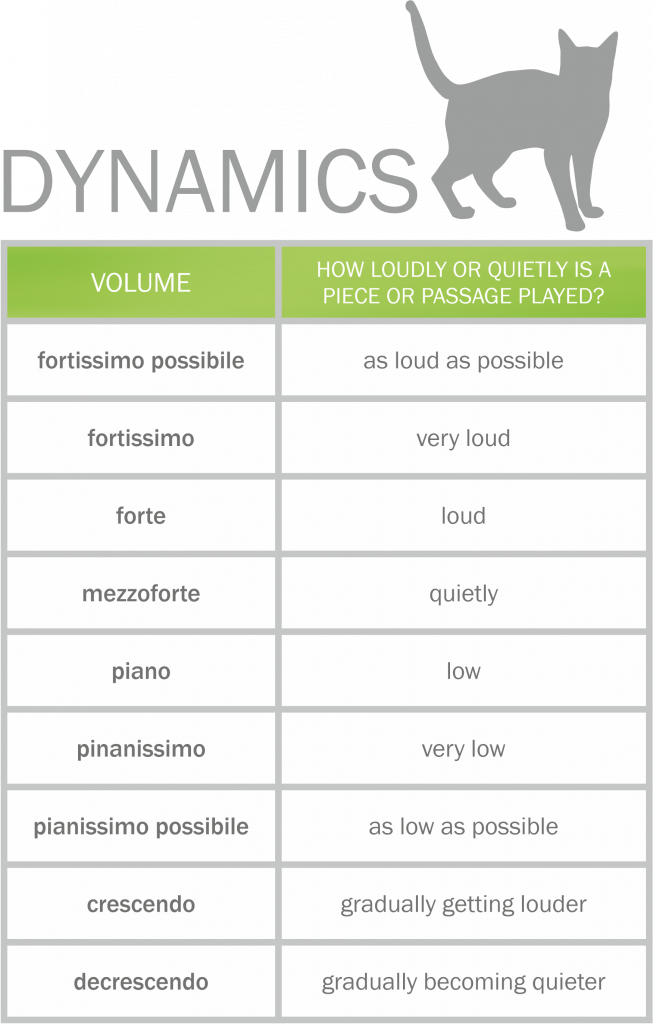
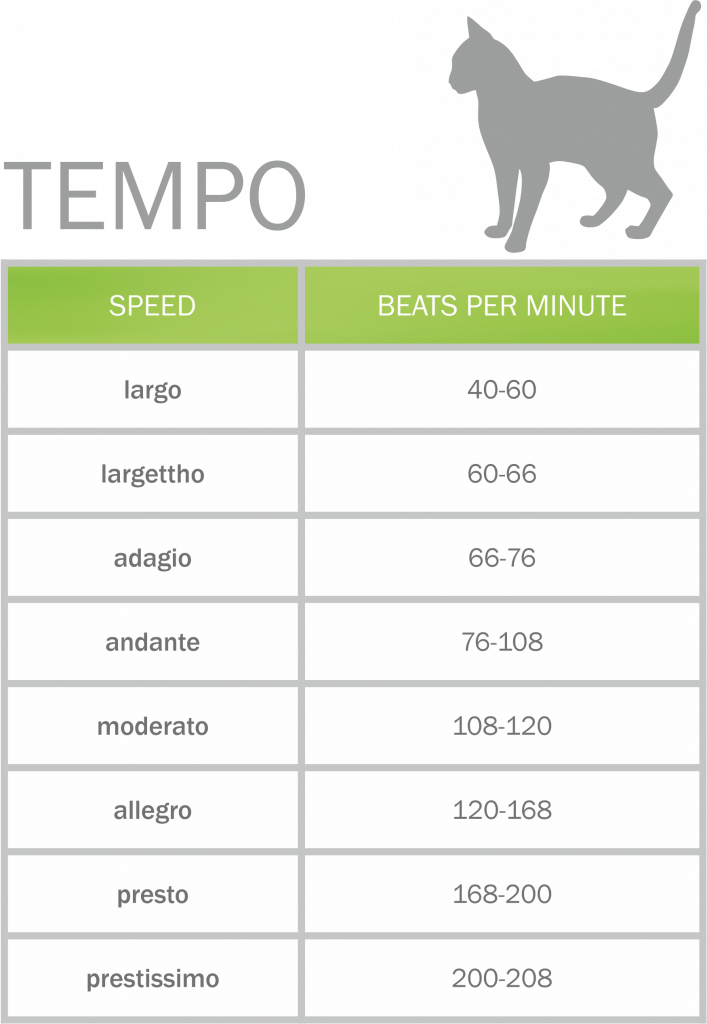
Cats don’t like noise
Music for cats should never be too loud. Since cats have a much more sensitive hearing than humans, keep the volume down!
Aggressive sounds, repeating staccato rhythms and chords don’t sound right to your cat’s ear – they are definitely not techno, trash or heavy metal fans! – Stick to the headset to avoid stressing them out.
Many different instruments and a mix of tonalities are not the right thing either – you would not find multiphonic jazz combos in a cat’s record collection.
Which soothing music is right for cats?
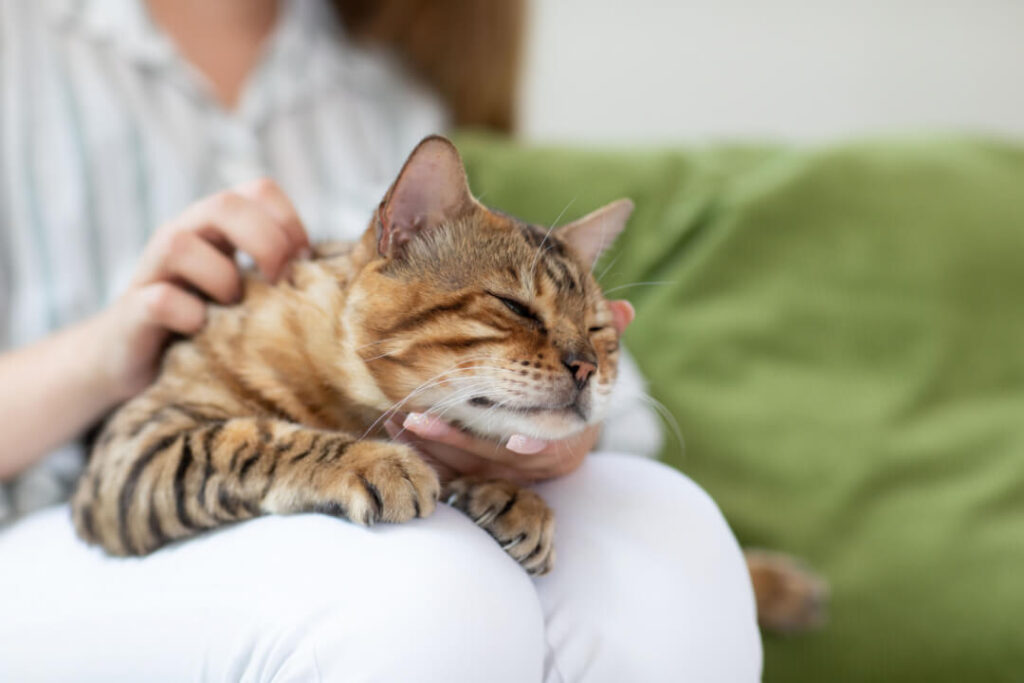
Now you know what type of music is not well received.
But what are the cats’ favourites?
What is the ideal chill-out music?
Is there any music which is not only pleasant but also de-stressing for cats? For example, relaxing and sleep-enhancing music? Classical music is often a safe choice: Baroque composers like Johann Sebastian Bach and Georg Friedrich Händel appease and relax our feline friends.
Soft classical music
Classical pieces are soothing not only for humans but also for cats. Tests have shown that music influences the vegetative nervous system which in turn controls the cardiovascular function. The kind of music we listen to even affects our blood pressure and breathing.
The soft, harmonious sounds also calm down our cats and lead to relaxed breathing and a well-balanced heartbeat – with some cats, even the pupils get smaller.
But which exact music has this effect? Not all cats like the same tunes – play a few pieces to your cat to find out about it’s taste. Here are some examples that should have a relaxing effect:
Johann Sebastian Bach
Goldberg-Variations (BWV 988)
Ludwig van Beethoven
Moonlight Sonata (op. 27, Nr. 2)
Piano concert No. 4 G-major (op. 58)
Frédéric Chopin
Fantaisie-Impromptu (op. 66)
Claude Debussy
La Mer
Wolfgang Amadeus Mozart
Symphony No. 40 G-minor, 2nd movement
(KV 550)
Maurice Ravel
Piano trio in A-minor
Camille Saint-Saëns
Symphonie Nr. 3 c-minor (op. 78)
Natural sounds and frequencies
If you are looking for soothing music for your cat, also try playing natural frequencies and sounds. Natural sounds have a relaxing effect on both humans and cats.
A prime example is the sound of sea waves.
This frequency (twelve vibrations per minute) is perceived as soothing, as it resembles our breathing rhythm during sleep. It does therefore not only remind us pleasantly of holidays on the beach, we also – subconsciously – connect it with relaxation and rest.
Also our cats search for these natural sounds and vibrations, which to them send “pleasant” and “calming” signals. Certain music used for meditation practise may for example have the same soothing effects on both you and your cat.
Music composed for cats
Various scientists have meanwhile conducted research on the musical taste of cats. The results were used to compose special cat music related to the frequencies used for communication among the animals.
By adding some conventional musical elements, these compositions were then made “human-friendly”, so that we can also enjoy them. Then, they were played to cats.
– The test subjects were thrilled! And this is how it was done:
Composers like Oliver Kerschner, Charles Snowdown or David Teie created species-appropriate music using the research results.
Admittedly, some pieces may be a little hard to get used for human ears at first – but cats just love it!
“Music for Cats”– David Teie
David Teie is a professional cellist with the Washington National Symphony Orchestra and teaches at the University of Maryland. Together with Professor Charles Snowdon, psychologist and expert for animal behaviour at the University of Wisconsin in Madison, he composed “Music for Cats”.
Cat fans from all over the world were enthusiastic and reported relaxed and soothed cats, caressing the loudspeakers!
You can get both the “Music for Cats” albums by David Teie here: www.musicforcats.com
